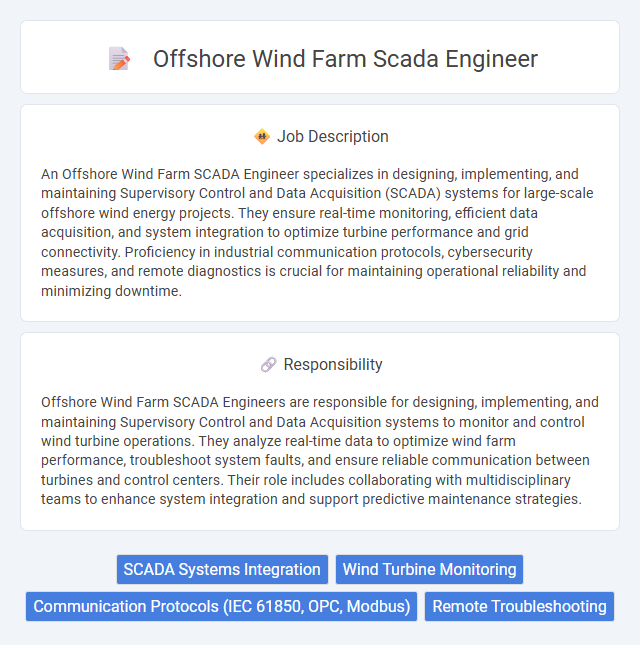
An Offshore Wind Farm SCADA Engineer specializes in designing, implementing, and maintaining Supervisory Control and Data Acquisition (SCADA) systems for large-scale offshore wind energy projects. They ensure real-time monitoring, efficient data acquisition, and system integration to optimize turbine performance and grid connectivity. Proficiency in industrial communication protocols, cybersecurity measures, and remote diagnostics is crucial for maintaining operational reliability and minimizing downtime.
Individuals with strong technical skills in SCADA systems and a passion for renewable energy are likely suitable for an Offshore Wind Farm SCADA Engineer role. Those comfortable with working in remote, often challenging offshore environments may find this job aligns well with their preferences and capabilities. Candidates who adapt quickly to dynamic conditions and possess excellent problem-solving abilities could have a higher probability of success in this position.
Qualification
A qualified Offshore Wind Farm SCADA Engineer requires a strong background in electrical or software engineering, with hands-on experience in Supervisory Control and Data Acquisition systems specific to wind energy projects. Proficiency in SCADA software platforms such as Siemens WinCC, ABB System 800xA, or GE iFIX, combined with expertise in network protocols like IEC 61850 and TCP/IP, is essential for effective system integration and troubleshooting. Familiarity with offshore safety standards, renewable energy regulations, and the ability to analyze real-time data ensure optimal performance and reliability of wind farm operations.
Responsibility
Offshore Wind Farm SCADA Engineers are responsible for designing, implementing, and maintaining Supervisory Control and Data Acquisition systems to monitor and control wind turbine operations. They analyze real-time data to optimize wind farm performance, troubleshoot system faults, and ensure reliable communication between turbines and control centers. Their role includes collaborating with multidisciplinary teams to enhance system integration and support predictive maintenance strategies.
Benefit
Offshore Wind Farm SCADA Engineers likely benefit from working in a cutting-edge environment that supports the transition to renewable energy. They may experience strong career growth due to increasing demand for offshore wind power and technological advancements. Opportunities for global collaboration and high-impact project involvement probably enhance job satisfaction and professional development.
Challenge
The role of an Offshore Wind Farm SCADA Engineer likely involves complex challenges related to monitoring and controlling large-scale renewable energy systems in harsh marine environments. Ensuring real-time data accuracy and system reliability under unpredictable weather conditions may require advanced troubleshooting skills and innovative problem-solving approaches. Managing the integration of diverse SCADA components while maintaining cybersecurity standards could further complicate operational efficiency and safety.
Career Advancement
Offshore Wind Farm SCADA Engineers develop expertise in monitoring, controlling, and optimizing wind turbine operations through advanced SCADA systems, leading to increased responsibility in project management and system integration. Mastery of real-time data analysis and predictive maintenance technologies opens pathways to senior technical roles or specialized consultancy positions within renewable energy firms. Continuous skill enhancement in IoT, cybersecurity, and large-scale data management is critical for career progression and leadership opportunities in the expanding offshore wind energy sector.
Key Terms
SCADA Systems Integration
SCADA Engineers in offshore wind farms specialize in the integration of Supervisory Control and Data Acquisition systems to ensure seamless communication between turbines, substations, and control centers. They develop, configure, and maintain real-time monitoring and control software that optimizes turbine performance and grid connectivity. Expertise in protocols such as IEC 61850, Modbus, and DNP3 is essential for effective data acquisition and system interoperability in harsh offshore environments.
Wind Turbine Monitoring
Offshore Wind Farm SCADA Engineers specialize in real-time wind turbine monitoring to enhance operational efficiency and prevent downtime. They utilize advanced Supervisory Control and Data Acquisition (SCADA) systems to collect and analyze performance data such as rotor speed, blade pitch, and power output. Expertise in fault detection algorithms and predictive maintenance tools ensures timely interventions, maximizing energy production and extending turbine lifespan.
Communication Protocols (IEC 61850, OPC, Modbus)
An Offshore Wind Farm SCADA Engineer specializes in designing and maintaining communication networks using protocols such as IEC 61850, OPC, and Modbus to ensure seamless data exchange between wind turbines, substations, and control centers. Mastery of IEC 61850 facilitates standardized automation and interoperability in electrical substations, while OPC and Modbus protocols enable real-time monitoring and control of diverse devices across the offshore environment. Proficient implementation of these communication protocols optimizes performance, enhances fault detection, and supports effective asset management in offshore wind farm operations.
Remote Troubleshooting
Offshore Wind Farm SCADA Engineers specialize in remote troubleshooting of Supervisory Control and Data Acquisition systems to ensure optimal performance and minimal downtime. They analyze real-time data from wind turbines and control systems, diagnosing faults and implementing software and hardware solutions remotely. Expertise in SCADA protocols, network communications, and cybersecurity is critical for efficient monitoring and rapid fault resolution in offshore environments.
 kuljobs.com
kuljobs.com